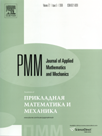 | | Journal of Applied
Mathematics and Mechanics
Russian Academy of Sciences | | Founded
in January 1936
(Translated from 1958)
Issued 6 times a year
ISSN 0021-8928
(print version) |
Archive of Issues
| Total articles in the database: | | 10610 |
| In Russian (Ï̀̀): | | 9811
|
| In English (J. Appl. Math. Mech.): | | 799 |
|
| << Previous article | Volume 75, Issue 4 / 2011 | Next article >> |
| A.G. Kulikovskii, "Multi-parameter fronts of strong discontinuities in continuum mechanics," J. Appl. Math. Mech. 75 (4), 378-389 (2011) |
| Year |
2011 |
Volume |
75 |
Issue |
4 |
Pages |
378-389 |
| Title |
Multi-parameter fronts of strong discontinuities in continuum mechanics |
| Author(s) |
A.G. Kulikovskii (Moscow, Russia, kulik@mi.ras.ru) |
| Abstract |
The strong discontinuities in solutions of hyperbolic systems of equations of continuum mechanics are considered. It is assumed that there is a flow of mass through the discontinuity front. If the number of boundary conditions that must be satisfied at a discontinuity (which follow from conservation laws or from other laws and assumptions) is less than the number of unknowns in the system of equations describing the state and motion of the medium behind the discontinuity, then as the discontinuity propagates along a specified fixed state of the medium, the set of possible states behind the discontinuity (shock adiabat) can depend on more than one parameter (multi-parameter discontinuities). The number of parameters on which a possible state behind a discontinuity depends can be reduced by introducing “additional” boundary conditions, which appear as conditions that ensure the existence of a solution for the discontinuity structure problem. These additional boundary conditions are specified by small-scale processes that occur within the structure, and terms corresponding to these processes must be introduced into the hyperbolic equations to describe them. Two examples of systems of equations related to the mechanics of deformable solids when multi-parameter discontinuities appear are considered, their structure is studied, and problems in which such discontinuities appear are considered. One of these examples is the description of a version of a phase transformation in the form of the formation of a non-linear elastic Kelvin-Voigt medium when a stream of non-interacting particles is compacted. In the other example the very simple case of the formation of a multi-parameter discontinuity as a consequence of the appearance of residual strains in a discontinuity is described. |
| Received |
06 December 2010 |
| Link to Fulltext |
|
| << Previous article | Volume 75, Issue 4 / 2011 | Next article >> |
|
 If you find a misprint on a webpage, please help us correct it promptly - just highlight and press Ctrl+Enter If you find a misprint on a webpage, please help us correct it promptly - just highlight and press Ctrl+Enter
|
|

 Russian
Russian  English
English